
31 minute read
Jack Buckskin on why our languages mat ter
Speaking language is an important way to reconnect with elders past and present, find pride in your culture and teach your children their heritage says Kaurna language teacher Jack Buckskin.
He addressed the Reconciliation in the North Morning Tea during Reconciliation Week and afterwards spoke to Aboriginal Way about learning and teaching Kaurna, the traditional language of the Adelaide Plains. When he was growing up, Mr Buckskin was not even aware of the language he was speaking. “I knew Aboriginal English, but I didn’t realise what languages I was speaking. Not until I got involved with learning Kaurna specifically that I realised that the words I knew weren’t Kaurna so I went to research where the words I knew as a kid fit into the picture. Then I started realising that within one sentence I knew five different Aboriginal languages. “That made me want to go and learn more Kaurna because I was like learn one language fluently, the rest are a bonus, but then eventually I can move in to learning them as well and try to learn as many different Aboriginal languages as I can,” he said.
Advertisement
Mr Buckskin’s interest in learning Kaurna grew from his involvement in traditional dancing. “A lot of the traditional songs are sung in language and the Elders, uncles that got me involved and cousins, didn’t really know too much language. “The whole idea was to go and learn language and then incorporate it into the dances and I guess reinvigorating those cultural dances. So the goal at first was to learn enough so we could incorporate it into dance, and then it just started growing,” he said. Mr Buckskin learnt the core parts the language from Karna language expert and University of Adelaide professor Rob Amery. “I learnt from Rob Amery from Adelaide Uni, he’s our main teacher of language, so I’d go to class once a week and he’d teach us all of the patterns,” he said.
But it was his own keen interest and life experience that really taught him to speak Kaurna.
“I guess you could say it was the linguist who got me on the right track and then it was just self-taught at home. “Some people would go to a class and think okay that’s where I do my learning. But that’s where I saw it as the opportunity to ask questions, but at home is where I did my own learning “I really wanted to learn. It was a passion, that I wanted to learn as much as I could as quickly as I could, so I spent as much time on it as I could,” Mr Buckskin said.
Mr Buckskin says that learning the language taught him about Kaurna culture in new ways. “The language can tell you things that we take for granted. Sometimes we get told the meanings and we think that’s the truth, but language itself can tell you a little bit more.
“There’s multiple layers to everything in our culture, like spirituality, there’s layers within our communities, within our environments so it’s about understanding those layers and breaking it all down,” he said.
“For example, there’s language written all over country. You know the Salisbury area the area is known as murlayaki which is the dry valley, and if you look from where we are and you go down the hill it’s the dry valley, it goes down and back up as you go out. “Now up in Tea Tree Gully is known as wirra which is the forest country, and if you look around there’s trees everywhere, and this country goes all the way out to Gawler and then crosses the border into the Ngadjuri people’s land, so it talks about relationship, just by the one name talks about relationships with other Aboriginal groups as well,” he said.
Mr Buckskin is now a well-known Kaurna language teacher himself. He moved from teaching Kaurna directly to teaching language teachers at Tauondi College in Port Adelaide.
“Well I spent five years teaching a lot of non-Aboriginal teachers and I probably had two Aboriginal students in that time, so I’ve stopped teaching to adults, now training the next generation of language teachers,” he said.
The place of Kaurna language teaching is slowly becoming established, Mr Buckskin says.
“Slowly now we’ve got accreditations, certificates in place, career development. When I started the linguist said you’ll never get a job in it, now we have career pathways for kids. “So now we’re just getting the word out that that’s what they want to do, teach about language and culture, that’s possible.
“That’s a massive empowering tool for an Aboriginal youth,” Mr Buckskin said.
He is also teaching Kaurna to his own children, the hardest students he’s had so far.
“The way to create first language speakers is to speak it to them from birth. So I spoke to my daughter from a young age so she is hearing it, understanding it, and then as she’s started getting older she’s understanding it but she still responds in English.
“I guess that’s a bit of a challenge because in our household mum speaks English and everyone else speaks English, and the only person that speaks in language is me.
“So it’s been a challenge, but now I’ve got two more boys, and because we used more language with them, she’s using more language too because it’s a communication tool between me and all of the kids, and sometimes my partner too now,” he said.
Above: Jack Buckskin addressing the Reconcilliation in the North Morning Tea during Reconcilliation Week.
Native Title Act amended to enable existing ILUAs
Federal Parliament has passed amendments to the Native Title Act that were proposed by the Government and ultimately supported by the Opposition.
The amendments were proposed in response to the Federal Court decision of McGlade. That decision required each and every member of the applicant group to execute Indigenous Land Use Agreements. That would be regardless of individual applicants being deceased or refusing to execute for any reason.
Native title service providers, including SA Native Title Services, representative bodies and land councils around Australia unanimously supported the amendments, in order to ensure the many Indigenous Land Use Agreements (ILUAs) threatened by the McGlade judgment remain valid.
The National Native Title Council welcomed the passage of the amendments, with Chief Executive Glen Kelly telling The Australian that the amendments ensured that no individual had the “right of veto over community decisions’’.
CEO of SA Native Title Services Keith Thomas said that the amendments returned certainty to a number of agreements in South Australia and were welcomed.
Update on Native Title claims in South Australia
SA Native Title Services (SANTS) continues to work with native title holders and claimants, their representatives and other stakeholders to resolve native title claims currently before the Courts. There are currently twenty three native title applications being dealt with in South Australia. One longstanding native title claim now has a trial date set while three others appear to be headed for determinations in September or October this year.
The Kaurna People’s Native Title Claim, which covers an area from the tip of the Fleurieu Peninsula and north to Redhill, is scheduled for trial commencing in April 2018.
The Ngarrindjeri and Others Native Title Claim, which covers an area around the River Murray, Lakes and Coorong region, is now working towards a consent determination in September 2017.
The Dieri No.3 Claim, which covers the area along the Eastern coast of Lake Eyre, is in case management, with a determination expected in September 2017.
Work continues on overlapping claims by the Adnyamathanha Peoples (Area C & F), Wilyakali No.2 and Ngadjuri Nation, located in the Flinders region, near the NSW border. Applicants are hopeful of a determination in October 2017.
Two new claims are currently being considered and prepared in South Australia and look to cross into other states.
Community members have authorised a claim for an area in the South East.
SANTS has been assisting the Yandruwandha Yawarrawarrka people, who hold native title rights over an area in the North East corner of South Australia, with the preparation of a further claim in Queensland and NSW.
Some current claims have reached important stages in their processing, with matters before the Court impacting on their progress.
Strike out applications have been filed in the Far West Coast Sea claim, with the hearings taking place in the Federal Court on 3 July.
An appeal to the decision in the Lake Torrens case is waiting on judgement from the Full Federal Court. Work continues on the Wirangu No.2 claim over an area on the west coast of the Eyre Peninsula. The State of South Australia is currently assessing the Native Title Report provided by the Applicant. The Narungga Nation’s claim is over the area covering the Yorke Peninsula. The Native Title Report for this claim is now completed and has been provided to the State Government for assessment.
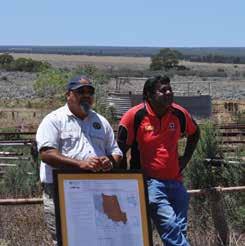
The Nauo No.2 claim has been amended and is undergoing the registration test, with work on a Native Title Report underway. The Tjayiwara Unmuru people’s compensation claim is in the far north of South Australia on the border with the Northern Territory. The matter remains in mediation with fruitful discussions underway to resolve the matter. Some active claims have been adjourned until the next callover, the hearing when the courts assess and prioritise all native title claims before them.
That includes the Malyankapa Peoples claim, which is for the area on the border with New South Wales from the boundary of the Wilyakali claim up to the Queensland border. The Ngadjuri No.2 and Wilyakali matters are also both adjourned until the next callover. Walka Wani Oodnadatta and Arabana No.2 are recent claims that are expected to progress by the next callover.
Kokatha No.3, Nukunu and Barngarla (Port Augusta overlap area) have also been adjourned to next callover. The Nukunu matter is also progressing along well and the applicants are hopeful of a consent determination in the future.
For full details of all Native Title Applications and Determinations, including access to detailed maps – head to the Native Title Tribunal website – www.ntt.gov.au and search the Registers and Applications Indigenous activist Yami Lester has passed away in Alice Springs at the age of 75. Yami was blinded by nuclear testing in outback Australia and spent decades as a nuclear and land rights campaigner. His family have released the following statement:
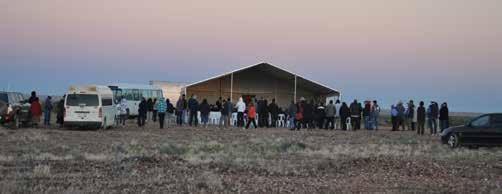
Yami Lester OAM 24 August 1941 to 21 July 2017
It is with great sadness that the family of Yami Lester announce the passing of Yami Lester (Poppa Yami), Yankunytjatjara leader and Elder, Land Rights and antinuclear campaigner on 21 July 2017, age 75.
Yami was born in the early 1940s at Walkinytjanu Creek (Wal-kin-jahnu) an outstation on Granite Downs Station in the far north of South Australia.
When the atomic bomb went off at Emu Field (the first test on the mainland), Yami was about ten years of age and through life would re-tell with clarity and sadness of his family being blanketed in the toxic fallout and the sickness and death that followed.
As a stockman and skilled horseman, Yami spent his early years working on pastoral properties across South Australia until losing his eyesight as a teenager and later becoming completely blind – the consequence of dust from the nuclear bomb.
He was a member of the Aboriginal Advancement League, was drawn to social work assisting families in need with health and education during work with the United Mission and was instrumental, together with the late Reverend Jim Downing, in the establishment of the Institute for Aboriginal Development in Alice Springs and the Pitjantjatjara Land Council.
As a professional interpreter and cultural broker he worked in the law courts making sure the voice of Anangu was understood. Yami made it his life’s work to campaign locally, nationally and internationally for the clean-up of Maralinga following the Nuclear Atomic Bomb testing by the British in the 1950s and 60s, for a Royal Commission and for compensation for destruction and contamination of country and the dispossession of Anangu. It was hard work rewarded with the extensive remediation of country as well as financial compensation for Maralinga Tjarutja peoples.
For several decades, supported by his children, he continued a relentless campaign against nuclear weapons as well as plans for a nuclear waste dump in South Australia. Earlier this year he welcomed the decision by the Australian Government to offer a Gold Card for health care for those affected by radiation fallout at Maralinga but reminded us it was too little too late.
Yami was a staunch land rights campaigner active in the handback of Anangu Pitjantjatjara (APY Lands) in far north South Australia to traditional owners as inalienable freehold title, as well as the monumental return of Uluru and Kata Tjuta to traditional owners in 1985.
He retired to his traditional lands at Walatina Station near Marla in the State’s far north, which will be his final resting place.
Yami’s story is depicted in the National Portrait Gallery. In 1981 he received an OAM for his service in the field of Aboriginal Welfare and has a published autobiography. His warmth, kindness, generosity and resolve inspired so many Aboriginal and non-Aboriginal people and as Tjamu (grandfather) and Katja (Great grandfather) he will be forever remembered by his loved ones, his extended family, community and by so many.
Yami leaves an incredible legacy of better global understanding of the devastation of nuclear bombs and for the ongoing battle for recognition of the consequence of them on the rights and interests of Anangu.
Memories of the man and his contribution will remain forever in the hearts of so many people, especially Bronya, Lucy and his children Leroy, Rosemary and Karina who have followed in his footsteps as interpreters and protectors of country and his twelve grandchildren (Lionel, Lachlan, Tahlia, Kieran, Kiah Robbie, Carlin, Leesha, Jessica, Joshua, William and Larissa and two great grandchildren (Lucy-May and Levi). Rest in Peace Dad and poppa.
Yami passed away peacefully in Alice Springs.
SA Native Title Services (SANTS) is a public company limited by guarantee and governed by a Board of Directors which oversees the strategic direction of the company. The majority of Board positions on the SANTS Board are designated for Aboriginal people. Our Board members bring a range of skills and experiences to their role directing the organisation.
April Lawrie – Chairperson
April heralds from the Mirning and Kokatha people of the far west coast, with many family and relatives living in Ceduna.
For many years, April was involved in supporting her Mirning people with pursuing land rights for the Nullarbor region, where the Mirning now co-manage the Nullarbor parks. April has also been involved in native title processes and governance on the state’s Far West Coast. After gaining confirmation of their native title rights in 2013, the Far West Coast Aboriginal Corporation is now a Regional Authority for South Australia.
April studied Social Work and has originally worked in Aboriginal foster care and later in a range of South Australian government agencies on Aboriginal issues across urban, rural and remote communities. Her current role is as Director of Aboriginal Education in the Department for Education and Child Development. She has devoted her time and skills over the last 25 years to Aboriginal issues across government and at the community level, in particular contributing to the formation of Aboriginal policy at the state and national level.
April has been on the Board of Directors for the Bullinda ‘Lawrie’ family homeland, the Far West Coast Aboriginal Corporation, Far West Coast Investment Pty Ltd, Far West Mining and Civil Company. She also served as an inaugural delegate to the National Congress of Australia’s First People, and on a national peak body council for PBCs.
Damian Coulthard – Deputy Chair
Damien is from Adnyamathanha country. He grew up in Quorn and Nepabunna South Australia being very connected to his heritage and culture. His passion for teaching and ability to lead started at a very early age when he first began playing sport.
This also led him to become a High School Teacher, now in his seventh year at Le Fevre High School in Semaphore. He is the coordinator for the South Australian Aboriginal Sports Training Academy (SAASTA) as well as Sports Coordinator for his school. The SAASTA academy focuses on academic learning, achievement and acceleration through sports, which he takes great pride in. He is a valued part of his School and very well respected by the staff, students and local community.
As a leader in his community Damien takes on many positions and roles to empower youth and his peers, one of which includes being Captain of his football team, Port Districts. His love for health and wellbeing also inspired him to take on a part time role as a personal trainer at Pushing Performance.
Damien’s role for local native food business Warndu incorporates direct relationship building with communities and wild harvesters. This is a hugely important role for the company as it is its core goal to build long term relationships with communities around Australia.
Paul Case – Treasurer
Paul is a Chartered Accountant with over 20 years’ commercial experience and is a Registered Company Auditor. Since joining MLCS Corporate in 1995 as Director of the company Paul’s expertise has developed with a major focus on business planning, strategic planning and development strategies to create wealth for his clients.
His industry experience covers the retail, tourism and mining sectors and in particular he has developed a niche offering to Native Title Claimants in exploring commercial opportunities associated with agreements.
John Briggs – Secretary
John is a proud Aboriginal man who identifies with the Yorta Yorta People from Cummrugunja (our home), which is part of the Barmah Forest on the Victoria, New South Wales border on the Murray River. John has devoted a large portion of his working life sharing his experiences and working with Aboriginal people in his local community and across the states and territories of Australia.
John is the General Manager of Intract (Indigenous Contracting services). In collaboration with the Aboriginal Foundation of South Australia and McMahon Services, Intract was established to provide contracting and training services to the civil construction and mining industries. As General Manager, this involves being active in establishing the operations of Intract, which include networking within the civil construction and mining industries, employing and training suitable staff including Aboriginal employees, undertaking projects and business development. Other experiences include: Director of Active Bobcats, Rio Tinto Supervisor/ Trainer for ATAL (Aboriginal Training & Liaison), Jackeroo, Mechanic, Hotel management, retail, telecom lineman, station overseer, plant operator and demolition. These positions have been held in farming, hotel, automotive, telecommunication, mining and civil construction industries.
Lavene Ngatokorua – Director
Lavene is Youth and Children’s Coordinator at Davenport Community and CEO of that community. She is a Wangkangurru, Adnyamathanha, Kuyani, Luritja woman from Davenport; an Aboriginal community located 300km north of Adelaide.
The Davenport community was known as Davenport Reserve before it formed its own Aboriginal community council in 1973. Lavene took on the demanding voluntary role of CEO after the community lost Government funding in 2014. Lavene has been involved in native title as a community member and observer, attending meetings and native title hearings for the Adnyamathanha people. She continues to contribute to the native title process for her people and all native title groups of SA through her involvement on the SANTS Board.
Lavene believes we need to learn from our Elders and think of new ways to build Aboriginal Nations. This means to provide people with better options to learn and take on business opportunities; to listen to people about their needs and aspirations. Lavene feels strongly about engagement and capacity development for all Aboriginal communities in South Australia and assisting PBCs (native title corporate bodies) with their future endeavours.
Allan Hunter – Director
Allan was admitted as a solicitor in South Australia in 1971. Until 1998 he practised in private practice in SA principally in litigation and
Clinton Pr yor welcomed
After seven months of walking to seek justice for First Nations people, campaigner Clinton Pryor was greeted by a large crowd of supporters and a police escort as he arrived in Adelaide and walked through Victoria Square.
Clinton Pryor is a Noongar, Yamatji, East Kimberley and Pilbara man walking from Perth to Parliament seeking audience with the Prime Minister and encouraging the community to stand up for justice.
On Monday 24 April, Mr Pryor’s Adelaide supporters came together to celebrate his arrival and walk alongside him on Kaurna Country, from Gepps Cross through to Tarndanyangga.
Mr Pryor says the idea for his walk came about after he spent 16 months in Heirisson Island protesting the forced closure of Indigenous communities.
“I realised how the system is failing our people and the injustices towards us, not just ourselves, but towards everyone else, made me realise the steps to do something and stand up for something,” he said.
Mr Pryor became a protester for forcibly closed communities and the homeless after experiencing homelessness himself following his father’s death.
“My brother died when I was 11 years old, then when dad died it shattered me, so I went to lose myself for two years,” he said.
Noonie Raymond has been travelling with Clinton since he left Perth after getting to know one another on Heirisson Island “I got involved with the First Nations people in 2012 and Clinton came to Heirisson Island later, and I got to know him well down there. He always had that drive in him,” he said.
Mr Raymond says the highlight of the journey was when Clinton asked him to come, and it’s been a buzz all the way through.
“When walking through the land you get an understanding of how the people travelled through there. The culture lives out there. We’ve been in the ancient lands and we’ve travelled on songlines, so it’s all there still,” he says.
Mr Pryor has been following songlines and visiting communities on his journey to Adelaide, the first major city on his walk to Canberra.
“Getting back to the city we got bit nervous because we haven’t been in the city for a while, but once we got here the nervousness went away.
“It’s amazing to see all these people walking behind me and joining us here on this march,” Mr Pryor said.
specialised in professional indemnity and then health law principally defending doctors and dentists. In 1998 he retired from Wallmans Solicitors, and joined United Medical Protection, now Avant, working in various management roles including Head of Claims, Deputy CEO and Acting CEO.
Since August 2007 he has worked as an independent consultant principally to Professional Indemnity Insurers, and Legal and Medical Practices. He was chairman of SAPMEA from June 2008 until June 2014, a founding director of SANTS and interim chair until November 2009, chair of the SA Law Claims Committee and in June 2017 appointed as a supplementary member of SACAT. Allan retired from private legal practice on 30 June 2017.
Craig Allen – Director
Craig is a Yandruwandha Yawarrawarrka man with a background in Psychology and Criminology. He has worked extensively On a personal level, he believes it imperative that custodians have their native title rights and interests recognised and he actively supports communities so they may engage in other opportunities and become more self-determinate. Troy currently works as Aboriginal Engagement Officer for WALGA Mining and Services which is 100% Aboriginal Owned. Troy has also been fortunate to work with two other Aboriginal owned Mining companies – Ngarda Civil and Mining (WA) and Rusca Bros (NT).
Troy’s work experience is very broad, having worked as a builder’s labourer in his teens, to working for the SA Ambulance Service for three years in his early 20s.
Troy has also advocated on behalf of Aboriginal prisoners and their families through his employment as an Aboriginal Liaison Officer at Yatala Labour Prison and also with the Aboriginal Prisoners and Offenders Services (APOSS).
Troy has been a member of numerous Boards over the past 20 years including as a Director on the Aboriginal Legal Rights Board.
throughout the country supporting Aboriginal and Torres Strait Islander individuals, families and communities.
Craig works within the philosophy of “Cultural Way First” which is reflected in his policy writing, consultation and advice surrounding strategic direction and reorientation of service for Aboriginal people. As Deputy Director (Poche) with Flinders University, Craig has been working collaboratively with Aboriginal and Non-Aboriginal people and the faculty of medicine, creating a comprehensive, culturally safe and secure Aboriginal health curricula in order to create greater understanding and promote attitudinal shifts in health service professionals. In addition to Craig’s work commitments with the university, Craig also finds time to give back to community and contributes his time, energy and expertise on a number of Aboriginal community-controlled boards. Craig intimately understands the spiritual and cultural connections Aboriginal people have with their respective custodial lands. Troy McNamara – Director
Troy has spent most of his life on the Eyre Peninsula, mainly in Whyalla, but in his younger years in Port Lincoln. Troy is a Barngarla man and he also has connection to the Narungga people on the Yorke Peninsula.
Troy’s connection to country is very strong and he often visits the Gawler Ranges where he has strong family ties.
Troy also gave evidence to the Federal Court in 2014, and in January 2015 Justice Mansfield ruled that the Barngarla people were the only Native Title holders for that area, and Barngarla had satisfied the requirements of the Native Title Act. For further information about our Board and staff visit our website at: www.nativetitlesa.org
d in Adelaide on his walk for justice
Mr Pryor says his arrival in Adelaide will make the remainder of the journey easier in terms of travelling and obtaining food and fuel, which was a struggle as he walked through the Western desert.
“No one does a walk through that Western desert through summer, it’s too dangerous, not much water out there.
“I felt like I was dehydrated and I felt like I was going to die, that’s when I realised I had to get up and push through because the communities are not far out there to get fresh water and that.
“Once we got over the hill, a community of people saw us and they came running over with water and food and I felt relief that I’d finally made it past the hardest bit of the journey, the 16-day walk,” he said.
While Mr Pryor has made it through the toughest physical part of his journey, he says his arrival in Adelaide is just a test run, and the next leg of his journey to Melbourne and Sydney will be a different kind of challenge.
“It will be harder in a way of talking to a lot of people, working with a lot of people, getting headaches, media interviews, organising stuff with communities down that way and with council groups and everything else, it will be more intense in that way,” he said.
Mr Pryor says the welcome he has received from people in remote communities on his journey and the stories they shared with him opened his eyes to a different world.
“Hearing of injustices where you had deaths in custody, removal of children, people were raped and on top of that we hear about the massacres that only took place back when our Elders were just young. They used to have to watch their dad or mother be shot off a cliff and you have society telling people to get over it. “It is a hard thing to move on, and this is what is really going on is there’s so much bad that has happened and so much injustice is happening and everywhere is failing. People are struggling these days and something has to be done to lift the people’s spirit up again.”
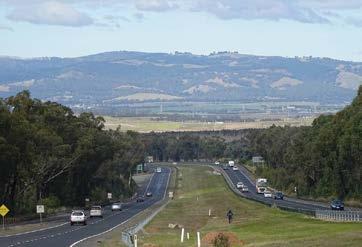
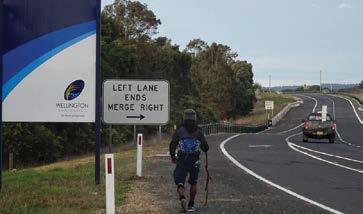
Mr Pryor says he hopes those inspired by his journey will also start to stand up for what they believe in.
“Get up and stand up, stand up for what you believe in. Stop talking about it over social media and complaining, start doing it and start believing.
“One thing I learnt about myself is how wise I have become with the knowledge I have collected. It made me become a stronger leader to keep going,” he said.
Mr Pryor says it’s up to the people to take a stand against the injustices towards them.
“There’s so much failing on the system right now from the Government itself towards to the Australian people, that it’s affecting all of us in a way that is making life hard.
“Everyone’s stressing out, life should be easier and peaceful and relaxing. Life should be easier for all the people of Australia,” he said.
Mr Raymond says while the journey has been the best of his life, he looks forward to the end because it can only be the beginning of many changes the country needs.
“Who knows what’s going to happen when we get there. Our plans have changed from what we started off with and Clinton’s got a fair bit of knowledge in his head now.
“Every day you learn and it’s been an incredible learning experience for Clinton and myself. It’s been a pleasure; I’ve literally loved it and I have no regrets whatsoever,” he said.
Clinton Pryor’s walk for justice can be followed via his website www.clintonswalkforjustice.org
People of the Red Sunset shining a light
An innovative media organisation that partners with young people from remote communities is behind a contagious new song and music video that is enjoying success and being viewed globally.
Desert Pea Media’s (DPM) recent collaboration with Bourke High School, a music video called ‘People of the Red Sunset’ received 300,000 views in just two weeks, was added to spot rotation on Triple J and was picked up by MTV.
Created in only 5 days, ‘People of the Red Sunset’ by the B-town Warriors is an ensemble hip-hop act from Bourke, NSW. The success of the project has led Desert Pea Media to confirm funding for another four projects in Bourke this year.
DPM is a charity organisation which works with individuals and communities in regional and remote areas around Australia, and uses the process of contemporary storytelling to engage participants and support them in creating important dialogue. They have had nearly 2 million views on their YouTube channel, mostly from young Indigenous people. Creative Director Toby Finlayson says music is a great way to teach young Indigenous people about their heritage.
“The more cultural content we can include in the productions, the more young people are learning about their culture, their identity, and their foundation. “Our key objective is to create work that makes Indigenous people proud and makes them feel connected to their country, and to their communities, and builds a bit of positivity,” he said. Another project entitled ‘Our Country, Our Way’ by The Mob, which was in partnership with a legal service in Broken Hill, made the Triple J hottest 100.
“We are really proud of the outcome and the community is really stoked, apparently the local radio gets 30 requests every day of that song, so they community is really proud of it,” Mr Finlayson said. Mr Finlayson says the work of Desert Pea Media is important to create conversation, as there’s a real need for change in Australia. “There’s a really horrific social and cultural history with our Indigenous population and the effects of that have been experienced today, every day.
“The highest suicide rate in the world is in young Indigenous people, there’s ridiculous rates of incarceration and chronic disease, and it’s really difficult,” he said. Mr Finlayson says creating a conversation about these issues and what can be done in response to the cultural and social devastation of Indigenous Australia is essential.
“Using art as a tool to kind of host that conversation in a way that’s nonconfrontational and a bit easier, we can really make some progress,” he said.
Mr Finlayson says to successfully create community and cultural development, DPM focuses on discussing how a particular community can bridge the gap between what is real and what is ideal in their environment.
“We ask them to think about the bridge, so how do we get from the real to the ideal, how we get from where we are to where we want to be. So all of the content, everything that is written, everything that goes into the songs and the films, comes from the words of the participants following that narrative.”
Mr Finlayson says DPM is comprised of a team of artists who range in their experiences and skills. While many were already established producers, song writers and artists, some are former participants of earlier projects.
“Some of our artists actually have come from project participants, so they’ve started off as kids in schools who have participated in our song writing projects and they’ve been mentored over the years to start facilitating projects, so it’s kind of a bit of an inter-generational skill base,” said Mr Finlayson.
Mr Finlayson says with the success of recent projects, Desert Pea Media are the busiest they have ever been, with many projects due for production and release in the coming months.in review
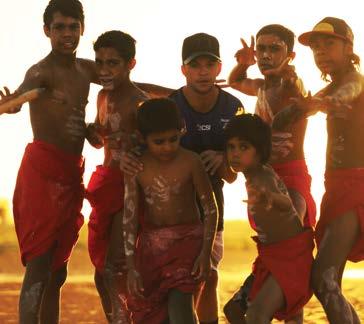
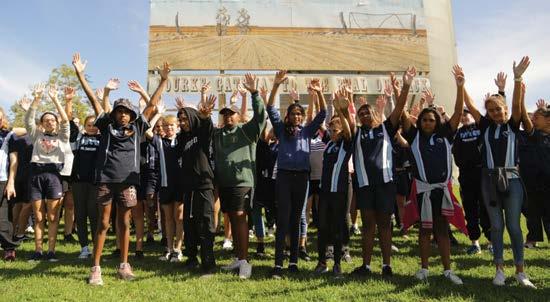
SANTS is recognised and funded as the Native Title Service Provider for South Australia by the Commonwealth Government under s203FE(1) of the Native Title Act 1993 (Cth).
SANTS provides legal representation and guidance, anthropological research and community liaison to support native title applications, negotiations and determinations.
SANTS performs all of the functions of a representative body in native title throughout South Australia.
Those functions as set out in Section 203B of the Native Title Act are: • Facilitation and assistance; • Certification; • Dispute resolution; • Notification; • Agreement making; • Internal review; and • Other functions.
SANTS provides a wide range of services to South Australia’s Aboriginal Nations who hold or may hold native title.
SANTS is committed to working with Aboriginal Nations to realise their aspirations, which are often broader than the recognition of native title.
Native title determinations now have been made over more than half of South Australia. There are currently fifteen PBCs established in SA to manage native title rights and interests.
SANTS works with many of these native title groups to enhance their position to manage their native title outcomes, comply with legislative responsibilities and develop and grow to achieve their aspirations.
Our activity in this area includes:
• developing and strengthening governance practices including through provision of legal advice, development of corporate policies and delivery of education and training initiatives;
• facilitating community-based planning to develop strategic and operational plans;
• developing and enhancing stakeholder relationships;
• implementing agreements and identifying, managing and enjoying native title benefits; • accessing business development services and advice;
• identifying and delivering community development projects including to protect cultural heritage and country;
• engaging in policy and legislative reform and implementation.
Recently, SANTS delivered its first corporate governance training program to PBCs and also delivered two financial management training sessions in partnership with PwC’s Indigenous Consulting (PIC).
In our work in community development, our focus is currently on protecting cultural heritage and caring for country. These collaborative caring for country projects are important for the ongoing exercise and protection of native title rights and interests.
SANTS welcomes Aboriginal Nations and native title groups who would like to work more with us.
SANTS receives funding from the Commonwealth and South Australian Government to perform its functions and to provide other services. SOUTH AUSTRALIAN NATIVE TITLE SERVICES
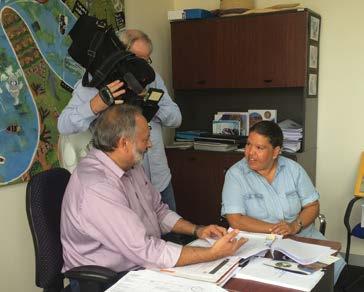
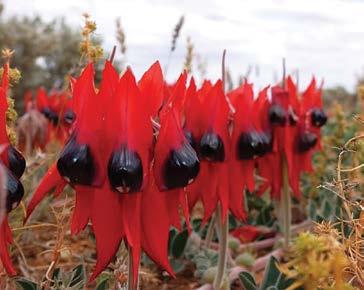
Level 4 345 King William Street ADELAIDE SA 5000
Editor Keith Thomas
Communications Officers Lucy Kingston Kaliah Alice
Contributor Shanisse Edson
Designer Alison Fort
Advertising Enquiries (08) 8110 2800
Circulation 10,000
If you have any stories of interest to our readers, please address any correspondence to:
editor@nativetitlesa.org
Aboriginal Way South Australian Native Title Services Level 4 345 King William Street ADELAIDE SA 5000
Ph: 8110 2800 Fax: 8110 2811 FREECALL: 1800 010 360
The Editor has the final decision on all stories and advertising that appear in this publication. w w w.nativetitlesa.org
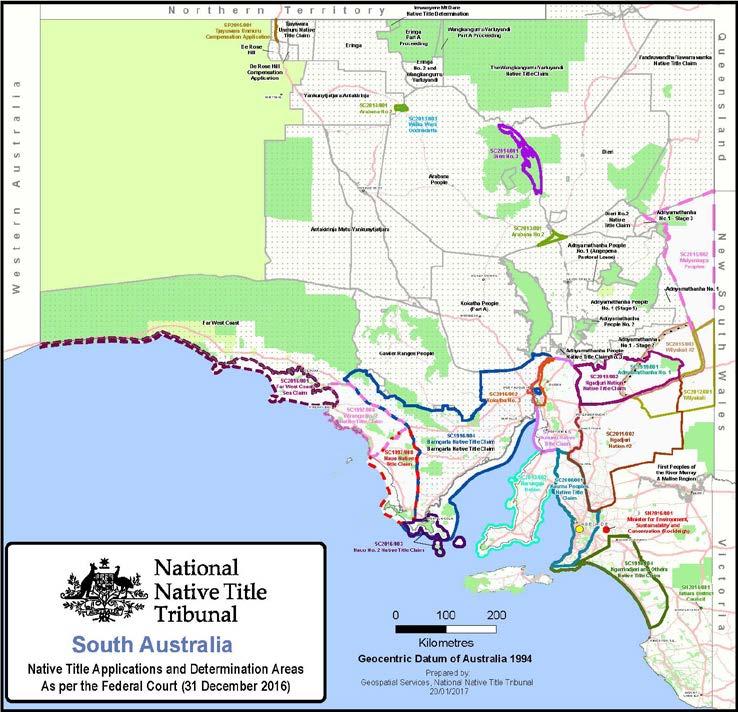
Get Aboriginal Way
Individuals or organisations can request free copies of this publication. Complete the form below and mail to 4/345 King William Street, Adelaide 5000 or email details to editor@nativetitlesa.org Name: __________________________________________________ Address: ________________________________________________ _________________________________ Postcode: _____________ Phone: __________________________________________________ Email: __________________________________________________ No. of copies: ____________________________________________
ISSUE 67
www.nativetitlesa.org
Radio program Aboriginal Message…
…airs each week on Wednesday at 3.30pm on 101.5FM in Adelaide. If you have an interesting story or event that you would like to share on radio, please contact Lucy Kingston on (08) 8110 2800 or email aboriginalmessage@nativetitlesa.org Listen online at http://radioadelaide.org.au/tags/aboriginal-message/




